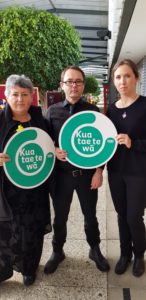
As primary school teachers threaten another strike on November 12, the Ministry of Education made a recent announcement of their new plan to hire more than 850 additional teachers from overseas.
The plan is to target more than 6000 overseas-based teachers in a new campaign with extra funding, to meet an expected shortfall next year.
Education Minister Chris Hipkins says that the Coalition Government is committed to an extra $10.5 million, on top of the $29.5m already announced late last year to ramp up teacher recruitment initiatives and increase funding for schools – bringing funding to $40m this year.
There will be easier access of up to $3000 per teacher finder’s fee to help schools offset recruitment costs, he says.
“We’ve also increased our overseas recruitment target for 2019 from 400 up to 900 and enlisted further recruitment agency support for schools. We’re focused on bringing New Zealand-trained teachers home, while also looking for other teachers from countries with qualifications similar to ours.”
Hipkins says that Immigration NZ is working with the Education Ministry and has directly emailed 6000 overseas teachers (in the UK, Ireland Canada, South Africa, Australia and Fiji) who’ve registered an interest in working here.
The Ministry is working with the Teaching Council to improve the support available to overseas-trained teachers, including a focus on induction that builds the culturally responsive practices needed to work in New Zealand
“A social media campaign targeting these groups is also underway and a campaign targeting New Zealand-trained teachers working overseas will follow soon.”

David Ellery, principal of Somerville Intermediate, cautions that the quality of the new recruits from overseas will be critical.
“Simply filling numbers won’t enhance the quality of education that our community expects from their schools. There were issues with quality in the last big overseas recruitment drive back in the 1990s,” says Ellery, who has been with the school 23 years.
“I think that new overseas recruits will face the same living cost challenges that other Auckland teachers face so that they may be inclined to go to other regions. This will exacerbate the problem for Auckland even further and provides no guarantee of addressing the acute shortages in Auckland.
“My understanding is that if school use a commercial recruitment agency to source teachers, then they can claim $3000 back from the MoE,” says Ellery.
“The trend for people going into teacher training is on a downward trajectory, which is concerning, especially when the attrition rate in the first five years in significant.
“Unfortunately there doesn’t appear to have been much forward thinking into teacher recruitment, remuneration and conditions, and we are again faced with playing catch-up. The schools and the children are left to face the brunt of the situation.”
However Michael Williams, principal of Pakuranga College and president of Secondary Principals’ Association, doesn’t agree.
He says the only option open to the government is to try and find overseas teachers to fill the gap.
“The ministry now has a planning tool which is helping them quantify the size of the teacher shortage.
“The measures announced are really just an extension and refinement of existing strategies. The data now shows that we will be at least 200 secondary teachers short and 850 primary teachers short for 2019
“The underlying problem is that we don’t train enough teachers in New Zealand, because not enough people want to go into teaching. The MoE’s new TV recruitment campaign is good and a significant pay rise would help,” he says.
Other key changes:
- Increasing the number of Overseas Relocation Grants to match the increased recruitment drive.
- Expanding the Teacher Education Refresh (TER) subsidy so it can be accessed by overseas teachers to meet certification requirements with the Teaching Council. Further support to teachers required to repeat or re-sit aspects of the TER programme, at no further cost.
- Changes to the criteria to enable more schools to access 3R National Fund- making it easier to recruit staff in shortage subject and isolated areas.
- Additional funding for agencies to process more overseas teacher applications.









